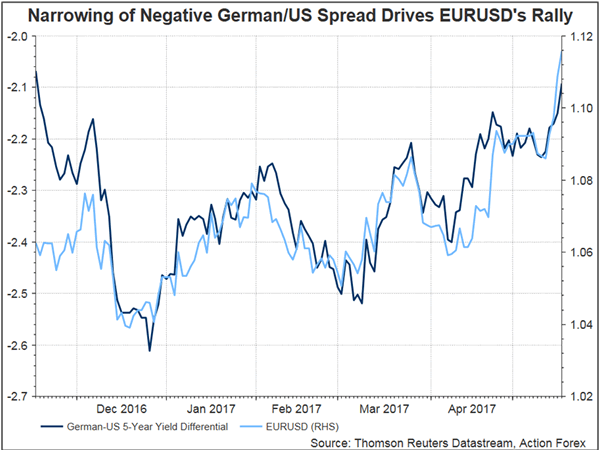USD’s slump accelerated as increasing political uncertainty, accompanying disappointing inflation data, has intensified concerns over the country’s growth outlook. Four consecutive days of selloff, accumulating loss of over -2%, has sent the DXY index to a 6-month low of 97.33 before recovery. Leading the rally against US dollar was the euro. With removal of one political risk after the French election, the market has turned its attention to the region’s economy of which the development have been encouraging. Rebound in inflation and positive sentiment indices have raised speculations that the ECB would add some hawkish twists in its forward guidance. EURUSD has rallied as much as +2.7% over the past 4 trading days. The sustainability of the single currency’s strength depends on the tone of ECB and FOMC meeting statements in June.

Former FBI Director James Comey backfired after fired by Trump. He allegedly said in a memo that Trump has asked him to drop the investigation into ex-national security advisor Michael Flynn. As Reuters noted, ‘reports that US President Donald Trump had asked then-FBI Director James Comey to end a probe into his former national security adviser have raised questions over whether obstruction of justice charges could be laid against the president”. The case has heightened concerns that political issues might postpone, and raise the difficulty of, the implantation of Trump’s economic plan, a theme underpinning the reflation trade of US stocks following Trump’s victory in the presidency. Such concern is not without ground. Indeed, Trump’s withdrawal of his healthcare plan, after repealing Obamacare, evidenced the internal conflict amongst the Republicans. It is not an easy task to over the dispute and get a bill passed despite its majority in both the House of Representatives and the Senate.
US’ inflation has shown signs slowing down. Headline CPI moderated to +2.2% y/y in April, down from +2.4% and +2.8% in March and +2.8% in February, respectively. Core CPI eased for a third consecutive month to +1.9% y/y in April. Yet, it would unlikely alter the Fed’s schedule of two more rate hikes this year (market consensus: one in June).
In the Eurozone, euro’s rally after the French presidential election was recharged by upbeat economic data. Headline CPI was confirmed at 1.9% y/y in April, marking acceleration from +1.5% a month ago. Core inflation, which excludes energy and seasonal food products, accelerated to +1.2% y/y from +0.8% y/y in March. The economic sentiment strengthened. The ZEW economic sentiment index for the Eurozone jumped +8.8 points to 35.1. For Germany, the biggest economy in the bloc, the reading climbed +1.1 point to 20.6 in May. Yet, the market had anticipated a strong increase to 22. The current situation index soared +3.8 points to 83.9.
The bloc’s trade surplus to 23.1B euro in March, beating expectations of, and February’s, 18.8B euro. Upbeat macroeconomic data have raised speculations that the ECB might adjust guidance, while maintaining the monetary policy and QE program unchanged, as growth risks are more balanced.
The scenario has presented a policy divergence in favor of the euro in the near-term. With the Fed’s two more rate hike almost priced in (bet for a June rate hike dropped), improving economic developments in the Eurozone has narrowed the negative German-US yield spread to a level not seen since November. This has supported the recent euro rally against US dollar.
Yet, whether such support can sustain depends on the June meetings (ECB and FOMC) and upcoming dataflow.
